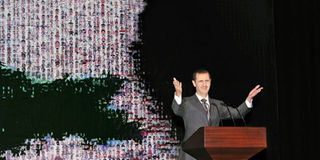Assad plan 'detached from reality': US

PHOTO | SANA A handout picture released by the official Syrian Arab News Agency (SANA) shows Syria's embattled President Bashar al-Assad making a public address on the latest developments in the country and the region on January 6, 2013 at the opera house in Damascus. Bashar al-Assad outlined a three-phase plan to resolve the 21-month conflict in his country in which, according to the UN, more than 60,000 people have died.
WASHINGTON
Syrian President Bashar al-Assad's road map to end the civil war ravaging his country is "detached from reality" and he should step down, the US State Department said Sunday.
Assad's speech "is yet another attempt by the regime to cling to power and does nothing to advance the Syrian people's goal of a political transition. His initiative is detached from reality," spokeswoman Victoria Nuland said.
Nuland also said that Assad's proposal undermined the work of special UN-Arab League peace envoy Lakhdar Brahimi, and "would only allow the regime to further perpetuate its bloody oppression of the Syrian people."
"For nearly two years, the Assad regime has brutalized its own people," she said.
"Assad has lost all legitimacy and must step aside to enable a political solution and a democratic transition that meets the aspirations of the Syrian people."
Earlier Sunday, Assad delivered a speech in which he outlined a three-phase plan to put an end to the 21-month-old conflict, which the United Nations says has claimed more than 60,000 lives.
The Syrian president branded the opposition "slaves" of the West and told foreign powers to stop backing the rebels.
"Right after that, our military operations will cease," Assad said, adding, without elaborating, that a mechanism would be set up to monitor any such truce.
Damascus would then step up contacts to convene a national dialogue conference with opponents "inside and outside" Syria who do not take orders from abroad. Eventually, a national charter would be drawn up and voted upon in a referendum.
Nuland however said Washington would continue to support Brahimi's efforts to implement a framework for peace endorsed by the five permanent members of the UN Security Council, the Arab League and the UN General Assembly.
She accused Assad's regime of "deliberately stoking sectarian tensions and continuing to kill its own people by attacking Sunni towns and villages" in parts of Latakia province.




